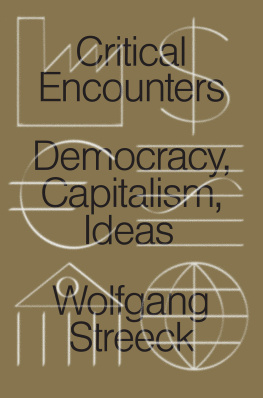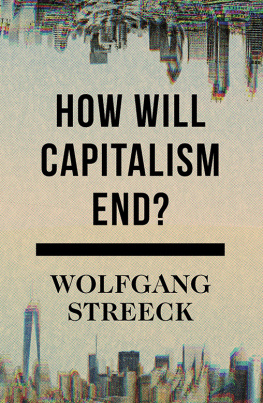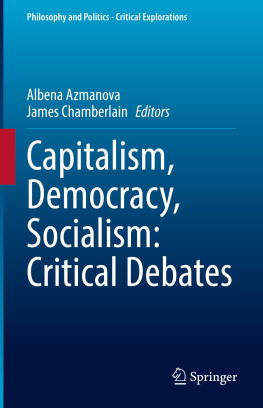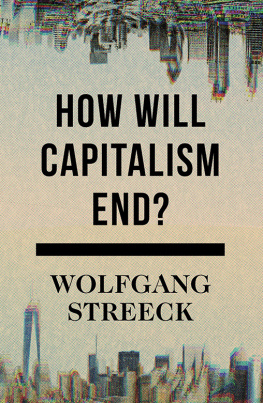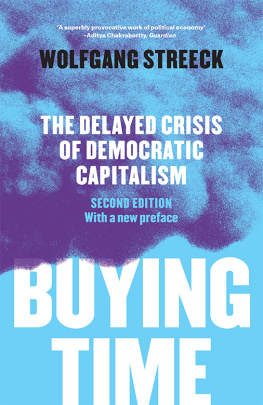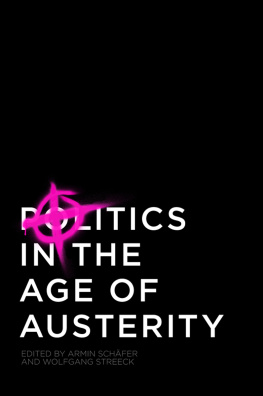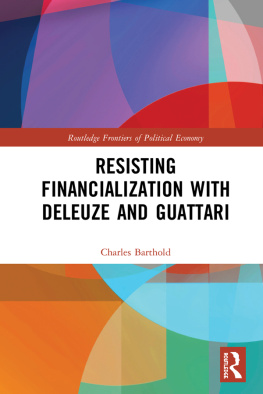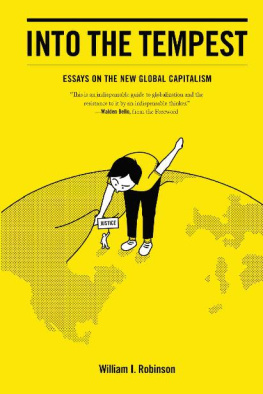Contents

CRITICAL ENCOUNTERS
CRITICAL ENCOUNTERS
Capitalism, Democracy, Ideas
Wolfgang Streeck

First published by Verso 2020
Wolfgang Streeck 2020
All rights reserved
The moral rights of the author have been asserted
1 3 5 7 9 10 8 6 4 2
Earlier versions of the following chapters were published as follows:
1. Through Unending Halls, London Review of Books, 7 February 2019; 2. The Fourth Power, New Left Review, no. 110, March/April 2018; 3. Constellations, vol. 23, no. 4, 2016; 4. ILR Review, vol. 71, no. 2, 2018; 5. Playing Catch Up, London Review of Books, 4 May 2017; 6. Greek to a Greek, Inference, vol. 4, no. 3, 2019; 7. The Politics of Exit, New Left Review, no. 88, July/August 2014; 8. Governance heit das Zauberwort, das alle Konfusion beenden soll, Frankfurter Allgemeine Zeitung, 31 March 2015; 9. Sonderweg aus der Solidaritt, Sddeutsche Zeitung, 27 March 2017; 10. Scenario for a Wonderful Tomorrow, London Review of Books, 30 March 2016; 11. Fighting the State, Development and Change, vol. 50, no. 3, 2019; 12. Sparen um jeden Preis, Sddeutsche Zeitung, 24 February 2015; 13. You Need a Gun, London Review of Books, 14 December 2017; 14. What about Capitalism? Jrgen Habermass Project of a European Democracy, European Political Science, vol. 16, no. 2, 2017; 15. From Speciation to Specialization, Social Research, vol. 85, no. 3, 2018; Chapters 8, 9 and 12 were translated from the German by Rodney Livingstone.
Verso
UK: 6 Meard Street, London W1F 0EG
US: 20 Jay Street, Suite 1010, Brooklyn, NY 11201
versobooks.com
Verso is the imprint of New Left Books
ISBN-13: 978-1-78873-874-3
ISBN-13: 978-1-78873-875-0 (UK EBK)
ISBN-13: 978-1-78873-876-7 (US EBK)
British Library Cataloguing in Publication Data
A catalogue record for this book is available from the British Library
Library of Congress Cataloging-in-Publication Data
A catalog record for this book is available from the Library of Congress
Typeset in Garamond by Biblichor Ltd, Edinburgh
Printed and bound by CPI Group (UK) Ltd, Croydon CR0 4YY
Contents
Joshua B. Freeman, Behemoth: A History of the Factory and the Making of the Modern World
Joseph Vogl, The Ascendancy of Finance
David M. Kotz, The Rise and Fall of Neoliberal Capitalism
Bruno Amable,Structural Crisis and Institutional Change in Modern Capitalism
Werner Plumpe, German Economic and Business History in the 19th and 20th Centuries
David B. Audretsch and Erik E. Lehmann, The Seven Secrets of Germany: Economic Resilience in an Era of Global Turbulence
Franz-Josef Meiers, Germanys Role in the Euro Crisis: Berlins Quest for a More Perfect Monetary Union
Yanis Varoufakis,Adults in the Room: My Battle with Europes Deep Establishment
Peter Mair, Ruling the Void: The Hollowing of Western Democracy
Helmut Willke,Demokratie in Zeiten der Konfusion [Democracy in an Age of Confusion]
Johannes Becker and Clemens Fuest, Der Odysseus-Komplex: Ein pragmatischer Vorschlag zur Lsung der Eurokrise [The Odysseus Complex: A Pragmatic Proposal to Resolve the Euro Crisis]
Martin Sandbu,Europes Orphan: The Future of the Euro and the Politics of Debt
Quinn Slobodian,Globalists: The End of Empire and the Birth of Neoliberalism
Mark Blyth,Austerity: The History of a Dangerous Idea
Perry Anderson,The H-Word: The Peripeteia of Hegemony and The Antinomies of Antonio Gramsci
Jrgen Habermas,The Lure of Technocracy
Charles Darwin,On the Origin of Species by Means of Natural Selection
C RITICAL ENCOUNTERS is a collection of essays on political economy, stimulated by reading books for review. It is also a celebration of the book as a medium of communication among scholars and with a wider public. Book reviews are occasional productions, not outflows of a specific research project. Someone assumes that somebody else might have something to say about a book deemed important enough to merit extended comment, and if author, title, blurb raise sufficient curiosity, a deal is done. Different book reviews by the same author, as collected in this volume, are therefore only loosely connected: by accident of personal acquaintance, of time believed to be free, or of the reviewers sense of adventure.
How to review a book that is worthy of being reviewed? For me it requires deep reading, beginning usually with the last chapter, then the introduction, then several expeditions into the interior. This takes time. During reading sessions, I highlight what I find remarkable and sketch my own emerging views in the margins, or on the last pages where the publisher advertises other, often related, books. When I am finished with a book, it looks a little deranged. Having let it sit for a while in this condition, I return to it and read my notes. Where they yield a pattern, for example by repeating themselves, is where the reading has left an impact. Then I begin writing.
Writing book reviews means taking the book seriously as a vehicle of scholarly communication; or, as in my case, even extolling it. In the social sciences, journal articles have come to predominate, which I find deplorable. One hears of university departments that consider candidates with books on their publications list ineligible for appointment and not only in economics, where writing books brands you as a borderline sociologist (which for a proper economist is the very worst thing that you can be). In my view, article writing is easy compared to book writing. For publication in the form of articles, insights from research may be and frequently are broken down to their smallest publishable units (SPUs), with one-and-a-half pages of theory at the beginning and an even shorter discussion at the end if at all, and in between something on method, data and results. Books, by comparison, are drawn-out Gedankenspiele arrangements of long chains of ideas, evolving step by step out of each other. Or a book may develop one dominant idea and access, present and discuss it from ever-new perspectives; reconstruct at length historical sequences and turn them into extensive narratives; offer a wealth of evidence in bright colours appealing in all of this to the curiosity of readers, their delight in well-told stories and striking, memorable examples. A good book is like a broad canvas, a large tapestry, something to feast on rather than gulp down like a piece of fast food.
Of course, those who care to read a book review want to learn what the book is about and where it belongs in the literature, and their expectations should be honoured. But a worthwhile review of a worthwhile book should also explore what a reader can do with it over and above digesting the facts it reports and the ideas it suggests where readers-as-users might discover new problems or gain new insights into older ones. As I wrote more and more book reviews, over the years, sometimes transgressing the limits of my own specialist expertise, I began to appreciate the genre for the opportunity it afforded for far-flung, or even speculative, thinking. The necessarily limited length of a book review could provide a good excuse for remaining, in places, suggestive or aphoristic, or for asking questions that one didnt, or couldnt, answer.

